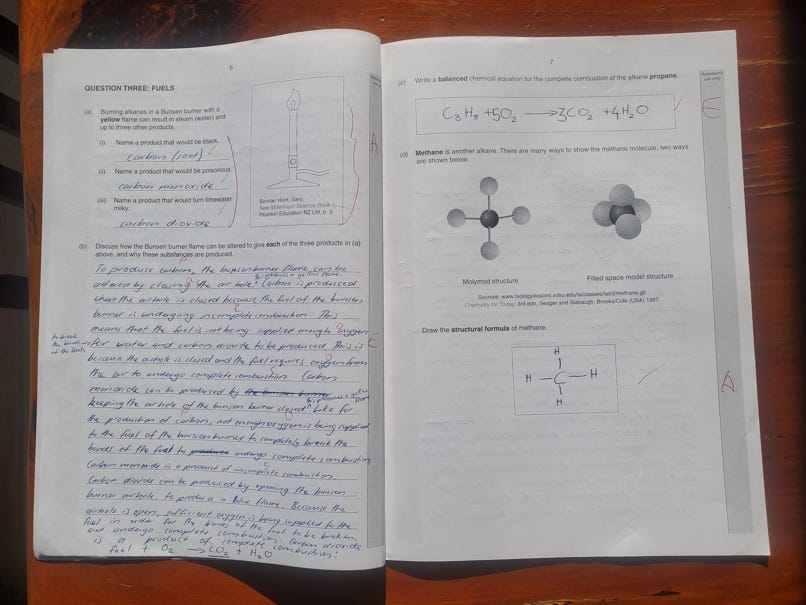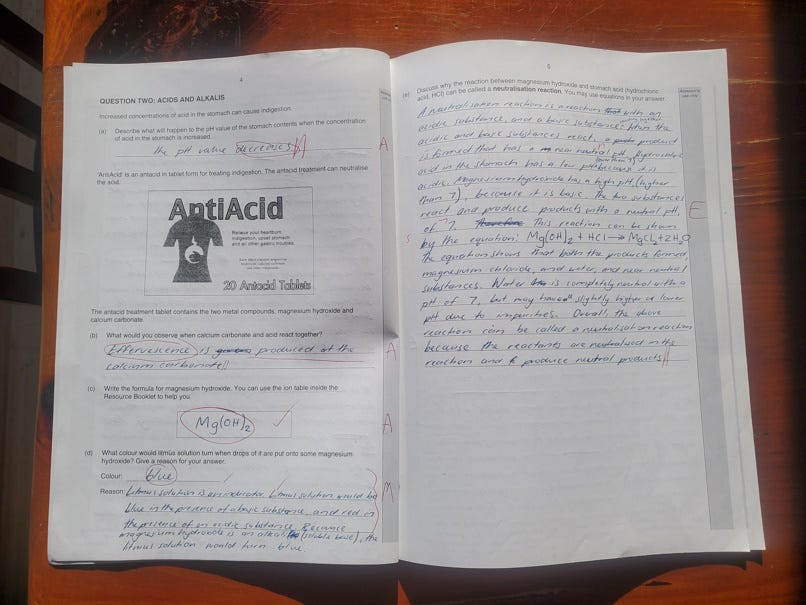Maths, English and Science: How to study for the holy trinity of high school subjects
A close look at the specific study techniques your teen needs to conquer high school's foundation subjects.
Generic study advice will say things like get rid of distractions, take regular breaks, eat well and get lots of sleep.
But if your teen doesn’t know how to study and has no idea where to start, that advice is not going to be overly helpful.
Here on Cram Lab, I get detailed. I want to share absolutely everything I know about studying, so your teen can learn how to study for themselves and figure out their unique Study System.
Part of that journey will be learning how to study for different subjects.
The study techniques your teen needs to study effectively for Maths are different than the techniques they need for English and other long-form / essay answer format exams.
So, what ARE the different techniques needed?!
Let’s take a look at the study techniques needed for high school’s core subjects — Maths, English and Science.
Maths
Let’s start with the subject your teen potentially hates the most.
One of the reasons so many teens struggle with Maths is because it is cumulative, which means once they fall behind, it’s hard to catch up.
Starting from the time our kids are teeny weeny they learn basic Maths skills, and from knowing how to count to 10, their knowledge builds. But it can only build once the previous step is conquered.
It’s really hard to wrap your head around algebra if you don’t know your times tables well enough.
So how can we make sure your teen doesn’t fall too far behind in Maths?
The key to getting good grades in Maths is to complete as many practice problems as it takes until answering each type of question becomes easy.
Just like your teen did when they were at primary school and they practiced their times tables over and over until they (hopefully) knew what 6 x 9 was without thinking, I want your teen to aim for being able to take one look at a question and know what type of question it is and what steps they need to follow.
As I’ve said, the only way to get proficient at Maths, is to do a tonne of practice questions. The good news is, this may not take as much time as your teen thinks.
Completing 10 practice questions after school might only take your teen 15-30 minutes, but that time spent practising will be invaluable.
English (and other long-form / essay subjects)
Unsurprisingly, a common theme across studying for all subjects, is practice. But what does that mean when it comes to English?
For the most part, it means writing practice essays.
Your teen obviously doesn’t know what the exact exam / essay questions are going to be, but they can still prepare for whatever those questions are going to be.
Here’s how.
By the time exams are approaching (and ideally earlier than that), your teen should know what key topics they are likely be examined on. These will be the ones they have spent the most time on in class — the really meaty important topics in each subject.
So for English, your teen might have studied a film or a novel, and in class they have probably covered the most important aspects of the film or novel, like themes and characters.
Again, they won’t know the exact exam questions they’re going to be asked, but they should be able to make some decent guesses.
For instance, they might get an essay question like, Discuss the themes in the film and how they were represented through film technique.
Exam essay questions tend to be generic, and the key is to mould what you know about the topic you have learnt about in class, to answer the question.
This is good news, because it means your teen can write practice essays about the topics they have been exploring in class — like theme, characters, plot, technique, language, etc — and get better and better at moulding what they know to answer specific essay questions.
This approach to preparing for exams with long-form / essay answers is, IMHO, the best way to prepare, because it has you practising the actual skills you’ll need in the exam.
That is, being familiar with the types of exam questions likely to come up, knowing how to write a well-structured essay under time pressure, and moulding what you know to answer the specific question being asked.
Science (inc Biology, Chemistry & Physics)
Science is often thought of as a black and white, know-it-or-don’t kind of subject. The other end of the spectrum to the arts.
But it’s actually both.
Yes there is a lot of ‘stuff’ your teen just needs to know. The atomic number of Calcium is 20.
But when it comes to exams, it won’t cut it if your teen has committed a bunch of facts to memory without actually understanding any of it.
So, when it comes to exam preparation, what to do?
Well, and you may have guessed it, exam preparation for science subjects is a mixture of what we’ve disucssed above for Maths and English.
There will be some things your teen just needs to practice and practice until they find it easy.
Like balancing chemical equations and solving physics problems.
CaCl2 + 2AgNO3 → Ca(NO3)2 + 2AgCl
a = ∆v ∆t
KE = 1/2 mv2 K
But they might also need to write short and long-form answers and explain and discuss scientific concepts.
Below are a couple of photos taken from one of my real high school Chemistry exam papers. You can see (even without knowing absolutely anything about Chemistry) that there are a mixture of Maths-based questions and long-form answers where I actually had to explain stuff.
So — depending on your teen’s curriculum of course — they probably need to prepare for both types of questions.
For the Maths-based questions, this means doing a bunch of practice problems, as discussed above in the Maths section. They key is to practice until it’s easy.
And for the written answers, it’s really important that your teen takes the time to actually understand the topics underpinning the types of questions likely to come up, because when it comes to written answers, examiners can see through flaky understanding.
I hope this overview of how to study for high school’s fundamental subjects helps your teen navigate a path through their exam study.
And hopefully they can see that even though studying is tough yakka, it really doesn’t need to be complicated to be effective.
Simple exam strategies are all that’s needed to get your teen the grades they're truly capable of.
How’s your teen going with their study at the moment? Are they struggling with particular subjects more than others? Let’s talk it out in the comments.
Thanks so much for reading.
Clare
P.S. If you haven’t already, share and/or download my free printout of How to Study for Different Subjects over at cramlab.org/study-system. It covers all of what I’ve talked about in this post and more.

P.P.S. There are fantastic resources out there to help your teen catch up if they’re struggling with Maths or Science. You may not need to look past Khan Academy. It’s fantastic.





